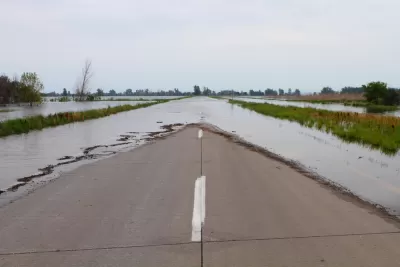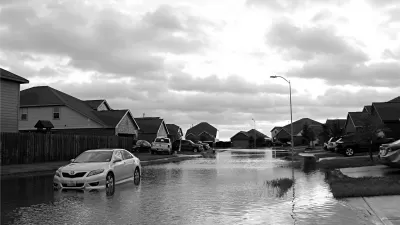The lack of disclosure laws in most states has led to an overvaluation of homes located in floodplains across the country.

Many American homeowners "remain unaware of the risks their properties face" because most states have nonexistent or inadequate flood risk disclosure laws, writes Jena Brooker for Grist. "This lack of transparency has created a false real estate market in parts of the U.S., according to new research from Stanford University and the University of North Carolina at Chapel Hill. The study, published in the journal Proceedings of the National Academies of Sciences, found there are almost 4 million single-family homes located in floodplains nationwide that collectively are overvalued by $44 billion based on their flood risk, or an average $11,526 per house."
Because land in floodplains is often cheaper, this disproportionately affects low-income families. "If you’re a household that invested a lot of money into a home in one of these places, we would be extremely concerned about the possibility of that home’s value dropping a lot and really wiping out a lot of wealth in communities that are vulnerable to begin with," says Miyuki Hino, lead author of the study and a professor at the University of North Carolina Chapel Hill. "Of the 10 states most at risk of severe flooding in the next 100 years, just three have flood risk disclosure laws — North Carolina, California, and Louisiana, according to data from the Natural Resources Defense Council."
"The scientists argue their new research isn’t just useful for studying flooding, but can also be applied to other climate change-related disasters that affect housing, including wildfires."
FULL STORY: Is your home in a flood-prone zone? In most states, you won’t find out until after you buy.

Planetizen Federal Action Tracker
A weekly monitor of how Trump’s orders and actions are impacting planners and planning in America.

Maui's Vacation Rental Debate Turns Ugly
Verbal attacks, misinformation campaigns and fistfights plague a high-stakes debate to convert thousands of vacation rentals into long-term housing.

Cuomo Is the Candidate of Both NIMBYs and Developers. What Gives?
In the New York City mayoral race, odd bedfellows align to preserve the housing status quo.

The Subversive Car-Free Guide to Trump's Great American Road Trip
Car-free ways to access Chicagoland’s best tourist attractions.

San Antonio and Austin are Fusing Into one Massive Megaregion
The region spanning the two central Texas cities is growing fast, posing challenges for local infrastructure and water supplies.

Charlottesville Temporarily Has No Zoning Code
A judge ordered the Virginia city to throw out its newly revised zoning code, leaving permitting for new development in legal limbo.
Urban Design for Planners 1: Software Tools
This six-course series explores essential urban design concepts using open source software and equips planners with the tools they need to participate fully in the urban design process.
Planning for Universal Design
Learn the tools for implementing Universal Design in planning regulations.
Heyer Gruel & Associates PA
JM Goldson LLC
Custer County Colorado
City of Camden Redevelopment Agency
City of Astoria
Transportation Research & Education Center (TREC) at Portland State University
Jefferson Parish Government
Camden Redevelopment Agency
City of Claremont




























